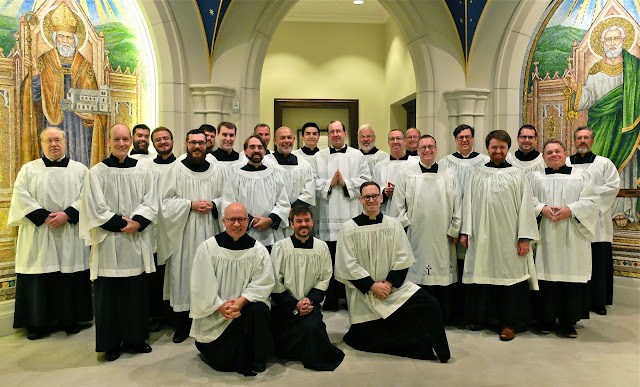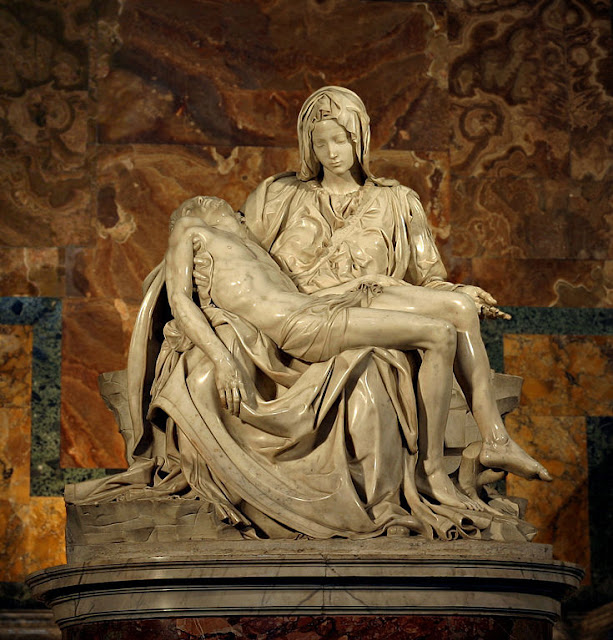Walking Through The Mass: the Credo
Attendees of the Ordinariate Mass habitually pray the Nicene Creed during the Sunday Mass.
Since becoming a regular at the Ordinariate Mass, I am reminded every week how blessed we in the Ordinariate are by having a beautiful translation of the Creed to pray.
Since becoming a regular at the Ordinariate Mass, I am reminded every week how blessed we in the Ordinariate are by having a beautiful translation of the Creed to pray.
While still a diocesan Catholic, I remember with joy and satisfaction the introduction of the revised (some might say a restored) English translation of the Creed for the Ordinary Form of the Mass. When I left diocesan precincts for the Ordinariate, I found the Credo as prayed in Divine Worship (DW), the Mass of the Ordinariate, to be awkward at first, though strangely attractive. The DW version motivated me to slow down and revisit each phrase.
Having been exposed to and shaped by the Credo of Divine Worship for a few years now, I cannot imagine returning to even the improved English text of the Ordinary Form Liturgy. The Nicene Creed professed in the Ordinariate, in that older liturgical dialect, is lyrical, confident and the rhythms and cadences found therein enable in the worshiper a sense of profound investment in the realities expressed in the Creed. Those cadences, accentuated by bows, the Sign of the Cross, grammatical and musical devices (e.g., text painting), deliver the worshiper into a drama that unites heart and mind and body and directs mental and physical faculties to dispose the worshiper to the presence and action of the Most Holy Trinity.
Having been exposed to and shaped by the Credo of Divine Worship for a few years now, I cannot imagine returning to even the improved English text of the Ordinary Form Liturgy. The Nicene Creed professed in the Ordinariate, in that older liturgical dialect, is lyrical, confident and the rhythms and cadences found therein enable in the worshiper a sense of profound investment in the realities expressed in the Creed. Those cadences, accentuated by bows, the Sign of the Cross, grammatical and musical devices (e.g., text painting), deliver the worshiper into a drama that unites heart and mind and body and directs mental and physical faculties to dispose the worshiper to the presence and action of the Most Holy Trinity.
Divine Worship was the occasion of my introduction to the Merbecke setting of the Credo. The syllabic Merbecke (pronounced Mar-beck) setting of the Creed quickly becomes familiar. The Merbecke chant enabled me to more quickly memorize the text than did merely speaking it.
Unlike many awkward contemporary settings heaped on the Ordinary Form Liturgy that at best compromise the natural rhythm of the text or, at worst, compromise the integrity of the Faith meant to be expressed therein, the chanted Merbecke Credo preserves the focus on and the theological integrity of the text so that its meaning may better form in us an habitual orientation to God.
Unlike many awkward contemporary settings heaped on the Ordinary Form Liturgy that at best compromise the natural rhythm of the text or, at worst, compromise the integrity of the Faith meant to be expressed therein, the chanted Merbecke Credo preserves the focus on and the theological integrity of the text so that its meaning may better form in us an habitual orientation to God.
The Catechism of the Catholic Church:
197 As on the day of our Baptism, when our whole life was entrusted to the "standard of teaching", let us embrace the Creed of our life-giving faith. To say the Credo with faith is to enter into communion with God, Father, Son and Holy Spirit, and also with the whole Church which transmits the faith to us and in whose midst we believe:
This Creed is the spiritual seal, our heart's meditation and an ever-present guardian; it is, unquestionably, the treasure of our soul.
When we pray the Creed, we begin "I Believe". As much as that "I" is a personal statement, this "I" is also the Church, a corporate "I". Catholics often speak of the Church as a person: "Holy Mother Church"; "She" (the bride and spouse of Christ; CCC796). Catholics, though many, are one in Christ Jesus.
Romans 12:5
So we, being many, are one body in Christ, and every one members one of another.
The Eucharist draws us and forms us into the one Body of Christ. The Eucharist is the Sacrament of Unity. While non-Catholics are entirely welcome to attend Mass and pray, and mindful of those legitimate and extraordinary exceptions listed in Canon Law that apply which permit reception under special circumstances or restrict reception of the Body and Blood of Christ to those properly disposed, the Precious Body and Blood of Christ may not be distributed to those not in Communion with the Church that Christ founded. To offer Holy Communion to non-Catholics under normal circumstances, or for that matter to Catholics not in a state of grace, would be to propagate a lie. I.e., the lie that there is unity in faith and morals where little or none exists, which would make a mockery of communion.
For an authoritative treatment of the question 'Who may receive Holy Communion?', click on the embedded links above and the following link:
The biblical teaching that undergirds Church Law is completely clear on the matter, and given the current widespread misunderstanding concerning the nature of the Holy Eucharist and Communion captured in a Pew survey, there is a serious and pressing need to improve catechesis that by necessity includes the true, good and beautiful celebration of the Mass.
For an authoritative treatment of the question 'Who may receive Holy Communion?', click on the embedded links above and the following link:
The biblical teaching that undergirds Church Law is completely clear on the matter, and given the current widespread misunderstanding concerning the nature of the Holy Eucharist and Communion captured in a Pew survey, there is a serious and pressing need to improve catechesis that by necessity includes the true, good and beautiful celebration of the Mass.
1 Corinthians 11:27-30Whoever, therefore, eats the bread or drinks the cup of the Lord in an unworthy manner will be guilty of profaning the body and blood of the Lord. Let a man examine himself, and so eat of the bread and drink of the cup. For any one who eats and drinks without discerning the body eats and drinks judgment upon himself. That is why many of you are weak and ill, and some have died.
Footnote: 1 Corinthians 11:30 Greek have fallen asleep (as in 15.6, 20)
The scandal of disunity among Christians should oblige us to work to resolve schism and disunity, to call all people into communion with the Church that Jesus founded on the Apostle Peter. The Ordinariate is a means by which that unity, willed by Christ, may be fostered in truth and charity.
The following text from the website of Saint John Henry Newman Ordinariate community of Victoria, BC, captures that mission to: reconcile believers and foster unity; to invite all to embrace new life in Christ.
The primary mission of the Personal Ordinariate of the Chair of St Peter is evangelisation.
The Ordinariate exists for those who are and who will be coming into full communion with the Catholic Church. Through the reverence and beauty of our worship, study of sacred Scripture and charity for those in need, we desire to share the joy of being Roman Catholic!
With respect and gratitude for the Anglican heritage that nourished us, we seek to build bridges with all our brothers and sisters who are drawn to the Church, so that we might build up the one Body of Christ.
Our mission is particularly experienced in our celebration of liturgy, which features Anglican traditions of worship while conforming to Catholic doctrinal, sacramental and liturgical standards. Through Divine Worship: The Missal - the liturgy that unites the Ordinariates throughout the English-speaking world - we share our distinctive commitment to praising God in the eloquence of the Anglican liturgical patrimony and Prayer Book English.
In addition, the founding documents of the Personal Ordinariate make clear that it is intended to be an instrument of Catholic unity: an opportunity to model what the future reconciliation of separated Christian communities could be. We wish to fulfill the Holy Father’s vision for Christian unity, in which diverse expressions of one faith are joined together in the Church.As we pray the Creed, we would do well to recall and recommit to the mission of the Church.
Nicene Creed
I believe in one God,
the Father Almighty, maker of heaven and earth, and of all things visible and invisible;
And in one Lord [bow] Jesus Christ, the Only Begotten Son of God, begotten of his Father before all worlds, God of God, Light of Light, very God of very God, begotten, not made, being of one substance with the Father; by whom all things were made; who for us men and for our salvation came down from heaven, [genuflect] and was incarnate by the Holy Ghost of the Virgin Mary, and was made man; [stand] and was crucified also for us under Pontius Pilate; he suffered and was buried; and the third day he rose again according to the Scriptures, and ascended into heaven, and sitteth on the right hand of the Father; and he shall come again, with glory, to judge both the quick and the dead; whose kingdom shall have no end.
And I believe in the Holy Ghost the Lord, the Giver of Life, who proceedeth from the Father and the Son; who with the Father and the Son together is [bow] worshipped and glorified; who spake by the Prophets.
And I believe one holy Catholic and Apostolic Church; I acknowledge one Baptism for the remission of sins; and I look for the resurrection of the dead, + and the life of the world to come. Amen.

.jpg)





Comments
Post a Comment
Your comments will be appreciated and posted if 1) they are on topic and 2) preserve decorum.
Stand by your word.